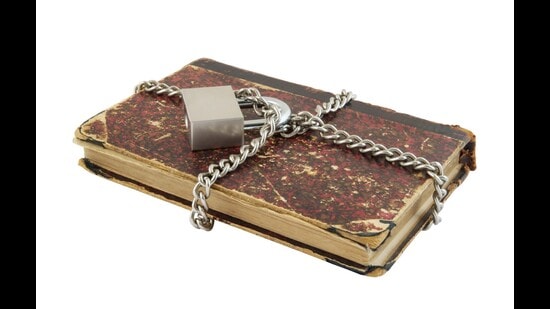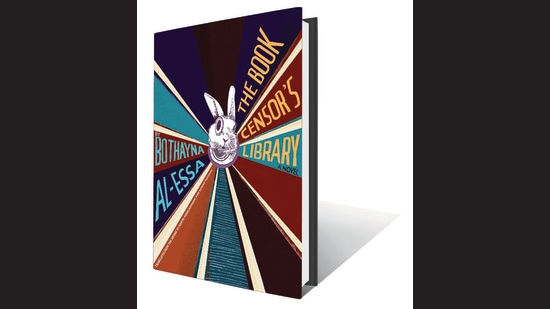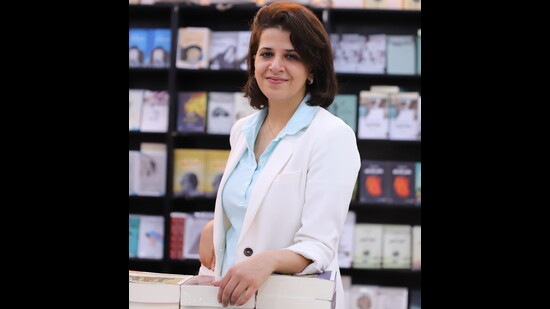Review: The Book Censor’s Library by Bothayna Al-Essa
Set in the future, this dystopic novel translated from the original Arabic, features a book censor tasked with banning books on a range of forbidden subjects including philosophy, poetry and novels
“As the book censor awoke one morning, filled with others’ words, he found himself transformed into a reader.” That Kafkaesque opening of Kuwaiti novelist Bothayna Al-Essa’s The Book Censor’s Library sets the tone for what is to follow. The novel, translated from the Arabic by Ranya Abdelrahman and Sawad Hussain, is more than just a surreal fantasy: it is also a fable of life and resistance under an oppressive regime.

The events of the book take place during an undefined future, “in a place that would be pointless to name, since it resembles every other place”. This is an environment in which an all-pervasive, authoritative government places strict controls on what people can read, among other activities. The censor of the title is part of a bureaucratic team that has to go through books with a view to banning them if they touch upon forbidden subjects such as philosophy, semiotics, linguistics, and sociology.

Also prohibited are poetry collections, novels, and other works that do not adhere to “the principles of the Popular Movement for Positive Realism,” as well as those that undermine public order and criticise political figures. These sneaky books had “sinister protocols to take over the world, to colonise and conquer — word by word, line by line, poisoning the world with meaning”. Can’t have that, of course.
A censor’s job is to curb imagination, he is firmly instructed. Language should be “an impenetrable surface… smooth and flat with no bottom where meaning could settle”. In this sanitised age, every word has only one meaning, the one approved by the Censorship Authority. Interpretation is the job of the establishment.
Things start to go awry when the censor comes across Nikos Kazantzakis’s Zorba the Greek. The book’s exuberance and passion cast a spell on him, and language becomes “a roller coaster, a sponge, a gateway”. He finds himself drawn to other books and dives deep into them, ignoring the stern words of the First Censor to stay on the surface. Underneath the “thin shell of erring language — guilty of indecency, blasphemy, inciting coups, and more — there was a delicate, strange world he was dying to touch”.
Inevitably, the censor comes across others who share his views and is drawn into an underground resistance movement to save worthwhile books from a conflagration during the ominously-named Purification Day. These volumes include classics, fables, folktales, songs from bygone civilizations, recipes for alternative medicines, stories of creation, as well as “Holy Books in their original editions, and the commentaries written about them”. A subversive plan is hatched to smuggle them into the cavernous basement of a dusty bookshop on the city’s fringes.
Such acts do little to assuage the censor’s domestic condition. Volumes pile up at home; his wife is suspicious because he mutters “Anna Karenina” in his sleep; and his story-loving daughter has a vivid imagination. This is worrying, as it is classified as a dangerous condition frowned upon by the authorities and punishable by sending the errant child to a grim rehabilitation centre. The censor’s public and private situations start to overlap, trapping him between a rock and a hard place.
The Book Censor’s Library contains many allusions to other fictional dystopias, notably George Orwell’s Nineteen Eighty-Four, but also works such as Ray Bradbury’s Fahrenheit 451 and Lewis Carrol’s Alice in Wonderland (with pesky white rabbits running amok in the censor’s office and being fed lettuce). Though the novel is bitingly satirical and engaging throughout, and can even be read as a bookish tribute to its precursors, there are times that one wishes that it would strike out into uncharted territory of its own.

In Bothayna Al-Essa’s dystopia, not all books are banned. Those that are freely available are written, according to the First Censor, “in service of the System”. These titles focus on success, money, love, and happiness – as though, the hapless censor thinks, a person could achieve these things by sheer willpower. It galls him to be informed by a book “that he was not a product of his circumstances but rather that his circumstances were his own creation”. Something to keep in mind the next time you browse the self-help and popular fiction sections of your bookstore.
At another point in the novel, the censor realises that the authorities are not waging a war against books but against reading itself. He begins to believe that in the future, there will be no need to ban books because no one will read them anyway – echoing a passage from Neil Postman’s 1985 work, Amusing Ourselves to Death, which contrasts the dystopias of Orwell and Huxley. Sadly enough, this scenario feels all too relevant for our time.
Sanjay Sipahimalani is a Mumbai-based writer and reviewer.






